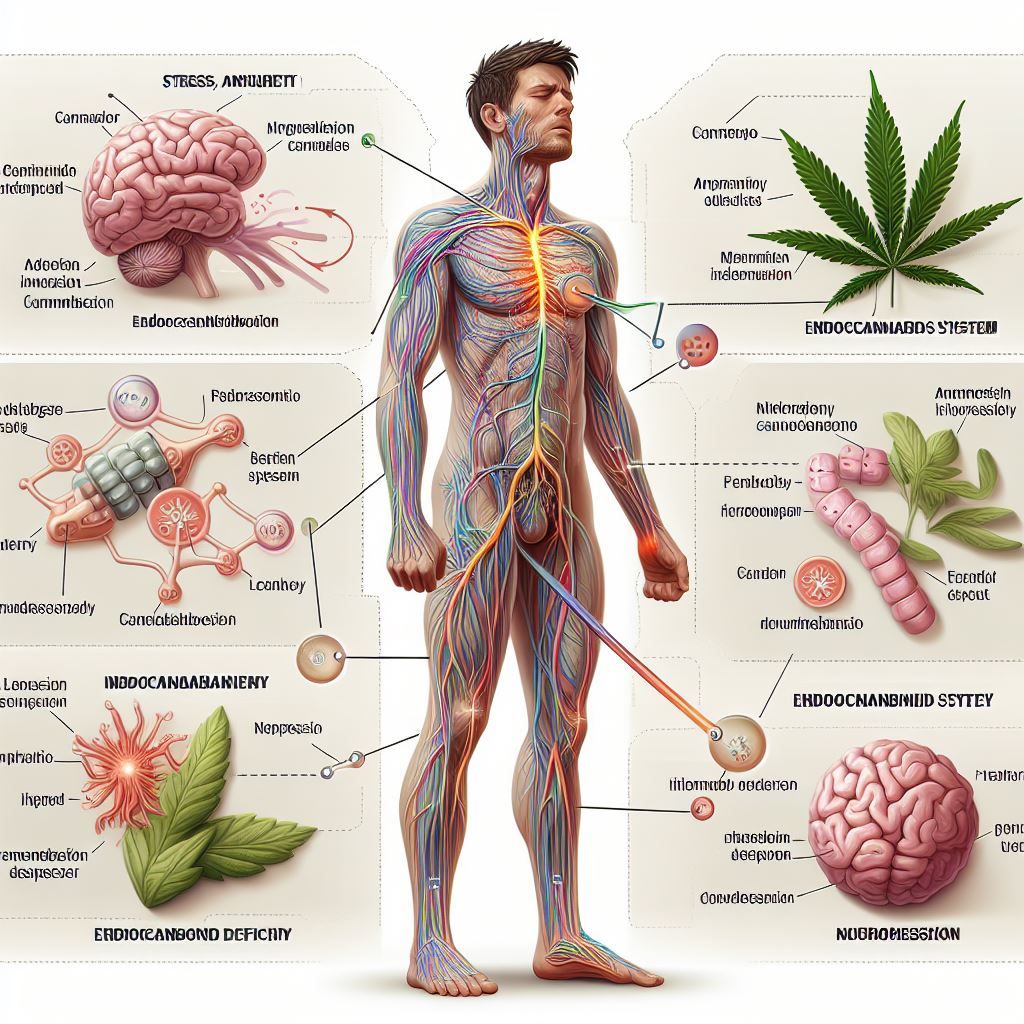Endocannabinoid Tone and Depression
Examining the Impact of Endocannabinoid Tone on Depression: A Comprehensive Guide

Introduction
The endocannabinoid system (ECS) is a complex cell-signaling system identified in the early 1990s. It consists of endocannabinoids, receptors that they bind to, and enzymes that synthesize and break them down. The ECS is involved in regulating a variety of physiological and cognitive processes including appetite, pain sensation, mood, memory, inflammation, stress response, sleep, and more.
Definition of Endocannabinoid Tone
Endocannabinoid tone refers to the overall level and activity of endocannabinoids in the body. It is determined by:
- The rates of anandamide and 2-AG synthesis
- The expression levels of cannabinoid receptors CB1 and CB2
- The activity levels of metabolic enzymes like FAAH and MAGL
When endocannabinoid tone is balanced, it promotes homeostasis. However, when it becomes overactive or underactive, it can contribute to health conditions like depression, anxiety, chronic pain, and more.
Explanation of the endocannabinoid system (ECS)
The key components of the ECS include:
- Endocannabinoids like anandamide and 2-AG
- Cannabinoid receptors CB1 and CB2
- Metabolic enzymes like FAAH and MAGL
Endocannabinoids bind to cannabinoid receptors throughout the body and brain. This triggers various cellular responses to help maintain homeostasis. The metabolic enzymes break down endocannabinoids after they are used.
Role of ECS in maintaining physiological balance
The ECS fine-tunes many of the body's systems to optimize health and homeostasis. This includes:
- Modulating neurotransmitter release in the brain
- Regulating inflammation in the immune system
- Controlling appetite and metabolism
- Influencing reproductive and digestive function
When the ECS falls out of balance, it can impair the body's ability to self-regulate, contributing to problems like chronic inflammation, pain, anxiety, depression, and more.
The Science Behind Endocannabinoid Tone
The endocannabinoid system (ECS) is a complex network of receptors, enzymes, and endogenous ligands that help regulate various physiological processes in the body and brain. Two main components make up the ECS: cannabinoid receptors and endocannabinoids along with their metabolic enzymes.
Cannabinoid Receptors
There are two primary cannabinoid receptors that have been identified: CB1 and CB2 receptors. CB1 receptors are predominantly found in the central and peripheral nervous systems, especially in areas of the brain associated with memory, cognition, reward, emotion, sensory perception, and movement control. In contrast, CB2 receptors are mainly expressed in immune tissues and cells, modulating inflammation and immune function.
Endocannabinoids and Their Metabolic Enzymes
The two major endocannabinoids produced in the body are anandamide (AEA) and 2-arachidonoylglycerol (2-AG). These endocannabinoids bind to and activate CB1 and CB2 receptors. The levels of endocannabinoids are tightly regulated by metabolic enzymes such as fatty acid amide hydrolase (FAAH), which breaks down AEA, and monoacylglycerol lipase (MAGL), which breaks down 2-AG.
Research on ECS and Neurotransmission
Emerging research has demonstrated that the ECS strongly influences neurotransmission in the brain. The ECS regulates the release of important neurotransmitters like dopamine, serotonin, GABA, and glutamate. Through these mechanisms, the ECS modulates neurocircuits involved in mood, motivation, pleasure, and reward.
In addition, the ECS impacts critical neuroendocrine and neuroimmune pathways. Dysfunction in these pathways has been implicated in stress-related mood disorders like depression. Therefore, ECS signaling may represent an important link between biological stress systems, inflammation, and psychiatric illness.
Overall, the ECS is a key neuromodulatory system that may play a central role in the development and expression of depressive disorders through its effects on neurotransmission, neuroendocrine function, and neuroinflammation.
Endocannabinoid Tone in Relation to Depression
Evidence of ECS Dysfunction in Depression
Several studies have shown evidence of endocannabinoid system (ECS) dysfunction in patients with depression. One key finding is that levels of the endocannabinoid anandamide are often reduced in the cerebrospinal fluid and blood of depressed patients compared to healthy controls.
Additionally, positron emission tomography (PET) scans have revealed altered CB1 receptor availability and density in specific brain regions implicated in depression, like the prefrontal cortex and limbic areas. This suggests there may be impaired endocannabinoid signaling in these critical mood regulation centers.
Neurobiological Insights into Psychiatric Disorders
The observed ECS alterations provide insight into the underlying neurobiology of mood disorders. The ECS heavily influences the hypothalamic-pituitary-adrenal (HPA) axis and stress response system, which are dysregulated in depression.
ECS dysfunction may also impact neurogenesis and neuroplasticity in brain regions like the hippocampus, which are important for cognition and emotional processing. Impaired endocannabinoid signaling likely contributes to or exacerbates the pathological changes seen in the brains of depressed patients.
Potential Therapeutic Approaches
These findings have led researchers to explore whether modulating endocannabinoid tone could have antidepressant effects. Strategies aim to inhibit endocannabinoid breakdown, increase production or binding affinity, or stimulate cannabinoid receptors.
Early clinical trials testing cannabinoid-based treatments for depression have shown promising results. However, more research is still needed to determine optimal approaches, efficacy compared to existing treatments, and long-term outcomes.
Emerging pharmacological treatments that target the ECS include inhibitors of the endocannabinoid-degrading enzyme fatty acid amide hydrolase (FAAH) as well as allosteric modulators and agonists of cannabinoid receptors.
Lifestyle Factors Influencing Endocannabinoid Tone
Diet and Exercise
What we eat and how active we are can significantly impact endocannabinoid tone and ECS function. Studies show that obesity and poor diet quality are associated with ECS dysfunction. Specifically, overactivity of the ECS is linked to increased appetite and preference for calorie-dense foods.
On the flip side, calorie restriction and exercise have been shown to normalize ECS tone. Both aerobic exercise and strength training can stimulate greater ECS signaling. This is associated with elevated mood, reduced anxiety, and protection against stress-related disorders.
To optimize endocannabinoid function through lifestyle, experts recommend a diet rich in omega-3s from fatty fish, fiber from fruits/veggies, and probiotics. Regular moderate-intensity exercise for 30-60 minutes daily is also advised. Maintaining a healthy body weight supports ECS balance as well.
Stress Management Techniques
Chronic stress takes a major toll on ECS function. Prolonged activation of the stress response disrupts endocannabinoid signaling pathways in the brain and body. This can negatively impact mood regulation.
Research confirms that stress management practices like mindfulness meditation have profound effects on restoring ECS tone. By eliciting the relaxation response, these techniques reduce excess cortisol and inflammation. They also stimulate endocannabinoid release and receptor activity.
Other restorative practices like yoga, breathwork, and massage therapy support the ECS as well. Making time for these on a regular basis protects endocannabinoid signaling pathways from the impacts of chronic stress.
Legal and Ethical Considerations in the UK
Current UK Laws on Cannabis and Derivatives
Medical cannabis regulations in the UK have evolved in recent years. Cannabis-based products can now be prescribed for conditions like epilepsy, multiple sclerosis, and chemotherapy-induced nausea. However, access remains limited and confusing due to strict licensing requirements. Doctors must submit lengthy applications detailing a patient's medical history, while ongoing costs put treatment out of reach for many.
Current laws also impede research into cannabis-based medicines. While GW Pharmaceuticals operates under a special license to grow cannabis and develop drugs, restrictions on cultivation and study of the raw plant matter persist. This slows clinical trials exploring the potential of cannabis components like CBD and THC in mental health treatment.
Ethical Concerns
Strict medical cannabis regulations raise ethical issues around patient access. Only a small fraction of eligible UK patients receive NHS prescriptions, forcing many to obtain cannabis illegally or privately at great personal expense. This creates inequality in access to potentially beneficial therapies.
There are also ethical concerns around stigma. Despite therapeutic benefits, cultural attitudes often still view cannabis as a dangerous recreational drug. This affects funding for research and willingness of doctors to prescribe. It also causes psychological distress for patients, who feel ashamed or criminalized for using a substance that improves their health.
More open, evidence-based dialogue around medical cannabis is needed to shift public perceptions. This will enable fair patient access while also expanding research opportunities.
Conclusion
The research summarized in this guide demonstrates the critical role of the endocannabinoid system in mental health and depression. Dysfunction in endocannabinoid signaling contributes to the development of depressive disorders through effects on neurotransmission, neuroendocrine function, and inflammation. Modulating endocannabinoid tone may provide therapeutic benefits by restoring balance to these systems.
Further research is still needed to fully elucidate the mechanisms linking the ECS to mood regulation. Clinical trials testing cannabinoid-based treatments for depression are also warranted, especially given the limitations of current pharmaceutical options. As laws and regulations continue evolving in the UK, ethical access to medical cannabis should be enabled to explore its potential.
Need for Further Studies
While preliminary evidence is promising, larger controlled studies are required to conclusively demonstrate whether directly or indirectly enhancing endocannabinoid signaling can improve outcomes in mood disorders. Research must delineate the nuances of how cannabinoids act on different components of the ECS throughout the brain and body. This will allow treatments to be tailored based on individual endocannabinoid deficiencies.
Potential Impact on Depression Management Strategies
If positive results continue emerging, modulating the ECS could fundamentally transform how depression is conceptualized and addressed. Rather than being limited to neurotransmitter-based approaches, treatment may focus more holistically on lifestyle factors influencing endocannabinoid tone like diet, exercise, sleep, and stress levels. Integrative care plans incorporating cannabinoid therapeutics could also be developed for patients not responding adequately to first-line interventions.


